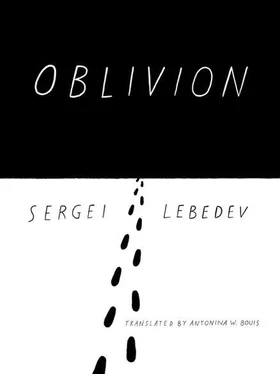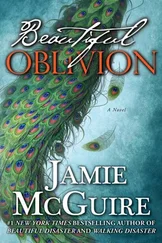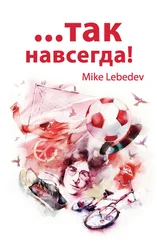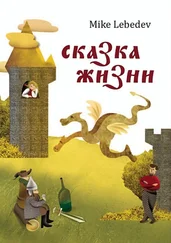I led Grandfather II along the paths and told him what I saw; suddenly I heard the bird-like screeches of the patients— they seemed to converse in their own language, inaccessible to the doctors, a language they spoke fluently, or else they had become somehow like gulls, and I thought they might fly up, settle on branches, and grow feathers. Grandfather II shuddered; that was so unusual that it scared me. He never shuddered, as if his body were frozen, and here some memory pushed him and bent him; he tried to pretend he was stretching out of weariness, but the pretense did not help: the squawks of the mental patients—a rare sound for the human voice—had reminded him of something in the past which had remained distinct, and Grandfather II whispered, thinking that I had moved away and could not hear him, “I won’t move, I won’t!” He whispered and stood stock-still, bringing his feet together as if he were standing in a narrow radiant place of his mind.
Later, when the screaming died down, Grandfather II asked me detailed questions about how the hospital looked and even, to my surprise, whether there was a crack in the wall to see what the patients looked like. I found a crack, but the patients had been taken away; all I saw were slate awnings— we had the same kind at our kindergarten—and two orderlies taking turns pushing each other in a wheelchair: they raced along the asphalt path, avoiding piles of bricks, laughing excitedly but joylessly.
I returned to the park as an adult: I came back gathering up all my memories of Grandfather II—and I met a patient escaping from the hospital.
The man was running through the woods, running like mad, as if it were not he, but somebody else twisted and cramped in the prison of his body; a man inside a man. This prisoner was running and trying to free something within himself; the fugitive fell on the ground, rolled in the leaves, banged against trees; his screams were muffled, as if he was screaming through his stomach. But his running and his fits were devoid of intensity, the body hindered him and sometimes, victorious, the man stopped, took a few disconnected steps, then hurtled himself into clumsy flight again; a person sewn into an animal skin or sack would run that way.
The fugitive came closer and I could see his face—empty of all emotion; his face, which had slipped lower under the weight of his own skull.
The madman ran toward the river; muddy, full of tires and rusty metal, but deep in places; deep enough to drown. You could surely see the river from the hospital windows; full of rubbish, filthy, with a stench of effluvia, steaming, it did not freeze in winter, and on frosty days a toxic fog the color of dog urine hovered over it; it emanated evil, like the filthy passage between garages, there was an affirmation of self-destruction about it, like alcoholics in the final stage of the disease; no wonder the local tramps drank along its shores, the men as murky as the water. The fugitive had not completely taken leave of reason, he could tell that here was the river and he ran toward it to die.
The orderlies cut him off; the fugitive grabbed a bottle, smashed it against a tree and stabbed himself, but the shards were too short, the pieces of glass merely pricked his tightened muscles.
I remembered that I had once seen a man running that way.
For several years I used to come out to work at a remote mountain mine; in those regions, roads exist only in the winter, when the swamps freeze and packed snow gives a better grip than asphalt; in summer you can get there only by helicopter. The remoteness turns these places into storehouses of time, cut off from the country’s overall life; the clubhouses still had red banners with white-lettered slogans hanging on the walls, ballot boxes were helicoptered in and police along with them, to deal with fights, thefts, and other minor crimes of the previous six months; essentially, there is no government except for the mine administration, there are no signs of the renewal of time, and people are drawn here from all over the country who could not fit in elsewhere, who are incapable of entering life, as if it were a revolving door that moved too quickly. There, in isolation, there is unity among people who have no one waiting for them, no one to write to.
These are strong men, but they are missing something; they are of necessity harsh but firmness and harshness do not let them feel or understand. These are strong men who secretly fear life; they gradually lose themselves, dissolving in particles; they could have mourned and suffered, but they didn’t have the ability to mourn or feel on a major scale, and so all they could do was drink and behave with reckless bravado.
In summer it is tolerable, there is the sense of space, changes in weather, and commensurate feelings. But in winter, when there is nothing but darkness, everything is snowed in and you are alone in the barracks, unspoken thoughts about the futility of life begin to eat at you. You don’t know what to do with these thoughts, you don’t have the habit of interacting with them, of safely releasing them into their orbits. You become superfluous; the protective carcass of strength and harshness comes off and you have no other defenses.
At the mine, the men lived in big railroad fuel cisterns which had been brought there suspended from helicopters; they cut out doors, laid a floor, insulated the metal walls, and added round windows; but still it was like living in a submarine in the middle of the mountains.
There were two inseparable friends there: Misha and Kolya, the local radio operator and one of the shaft diggers. People viewed them as one person; they jointly owned the only washing machine at the mine, which they used to brew their own beer, they hunted together—they joked that the double-barrel was invented for them. They were the only ones who never argued with each other, and in a fight they stood shoulder to shoulder; there was something strange and unnatural in their mutual sensitivity, as if there were no friction between them. I went there year after year, some things changed, people grew closer and drifted apart, but those two were always together, and at some point I started to think that it would not end well; that once—over some trifle—there would be an explosion, and the two would clash fiercely, making up for years of meekly putting up with each other’s weaknesses; I thought they already hated each other but did not know it yet, and every friendly gesture, every service, every word just added fuel to the future fire.
I don’t know why I thought that way; whether shadows of the future fell on their faces or if something in their lives gave off a hint; the radio operator had a doormat in front of his house that was actually a druse of centimeter-sized transparent crystals, for people to clean their shoes before entering; when it got dirty, he threw out the druse and put down a new one. The miner once saved and nurtured a dog that had its leg squashed by a truck. The lame dog repaid him once when the miner fell down drunk in the snow by running up to him and keeping him awake so he would not freeze to death; the next winter when the miner’s hat was worn out, he shot the dog for its fur. That crystal druse used for wiping feet, the lame dog shot for its fur—those were not random things, they revealed the inner bluster of decay; it passed for braggadocio, for tough manliness, and the poisonous rot infected them deeper and deeper.
It resolved itself one winter night; the radio operator and the miner were coming home drunk from the base; as the miner later told it, the radio man fell down and asked for matches to light a fire, it was very cold, but the miner refused, he had only one match left and he was planning to have a smoke halfway there; he was so looking forward to that cigarette that he wouldn’t give up the match, and he thought his friend was fooling and would get up; the radio operator cursed the miner—You won’t give up your match!—which made the miner angry. He burned the match and went on alone to the settlement, certain that the radio operator would follow. But the man was too drunk, he couldn’t get up, his cries were dispersed by the wind, and he froze, fell asleep turning stiff; they found the burned match in his fingers.
Читать дальше












